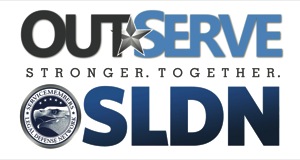
Last week, Servicemembers Legal Defense Network (SLDN) and OutServe, the association of actively serving LGBT military personnel, announced the selection of transgender Army veteran Allyson Robinson to lead the newly combined organization. In her first interview since her appointment Robinson spoke to San Diego LGBT Weekly columnist Autumn Sandeen about her new role and what she wanted to achieve.
Autumn Sandeen: Allyson, thank you so much for taking the time to speak to me.
In the recent OutServe-SLDN video (See the video at LGBTweekly.com) you identified the repeal of the Defense of Marriage Act (DOMA) and open service for transgender servicemembers as two issues where LGBT servicemembers are being left behind. Will they be the two primary issues for OutServe-SLDN going forward?
Allyson Robinson: Thanks for asking that. That’s what really brought me into this work; what made me first want to do this job. As I watched the national conversation and the movement conversation since repeal of Don’t Ask, Don’t Tell, I started to sense this feeling that we were done; that we could move on from focusing on these issues and place our focus elsewhere. In fact, I’ve heard people express those things explicitly to me over the past couple of years.
But, it was very clear to me that we were not done – that we really had just started. The repeal of Don’t Ask, Don’t Tell represented just the beginning of the fight for full equality for LGBT servicemembers.
That dissonance between what I was seeing and what I knew to be true touched one of my most deeply held values. That is, we don’t leave anyone behind. That’s who we are as servicemembers and who we are as veterans.
In the OutServe-SLDN video I mentioned DOMA very specifically. DOMA is having a distinctly negative impact on the lives of gay and lesbian servicemembers and their families. It prevents the Department of Defense (DOD) and their units from recognizing their relationships and their families.
One of those things about DOMA is that it’s a national security issue.
When a servicemember deploys, their family isn’t just left hanging back at home station. They have a family support group. They have access to medical facilities and to the PX or BX, the commissary – all of these other facilities. They have the comfort of knowing that, God forbid, should something terrible happen to their servicemember, they’ll be able to visit them in the hospital. That they’ll be among the first to know when that happens.
And, knowing that our families are cared for and supported allows us, as soldiers or sailors or airmen or Marines or Coast Guardsmen, to fight more effectively. We know they are being taken care of back home.
Not having that knowledge has a negative impact on somebody. It has a negative impact on war fighting capability. That’s why DOMA is a national security issue. That’s one.
Two, there are actually many, many benefits that the DOD could grant today with the stroke of a pen. They’re not dependent upon DOMA. The DOD has developed recommendations; they have not acted on those recommendations. I would love to ask them why. What is holding us up?
You may have that opportunity now?
I certainly will, and I will make that opportunity now. It is our family members – our servicemembers’ families – we owe them more than that. Their sacrifice entitles them to more consideration than they’re being given at the Pentagon right now.
Open service for qualified transgender Americans is a priority for us as well – this is number three.
There are many of us who would love the opportunity to serve our country and who are willing to put our lives on the line for the nation and its people. We are being prevented from doing so by outdated medical regulations; by a set of archaic policies related to transgender and gender variant people.
Clearly, this is an area that OutServe has had as a part of its mission from the beginning. SLDN, from very early in its existence, has as well. It’s an area that I had the privilege to work on while I was at the Human Rights Campaign (HRC), and I’m bringing that with me.
And then the fourth, Autumn, has to do with our veterans. Considerations for transgender veterans – changes to their documentation.
Right. DD-214s and such.
A lot of gay and lesbian servicemembers – whether they were kicked out under Don’t Ask, Don’t Tell or prior, now have “homosexual conduct,” “personality disorder,” and on and on, stamped on their DD-214s – their official military personnel records.
As you know, those things have a very real impact on a veteran’s life after they’ve left the service. SLDN has been very involved since repeal in helping servicemembers upgrade their discharge status. We’re going to continue to be involved in helping veterans to ensure that their records reflect their honorable service.
Those are the four things I’ve put out there that are going to be our priorities.

On that last point, is this actually changing the DD-214 discharge document, or would the upgrade be changed by DD-215s as a correction to the DD-214?
According to OutServe-SLDN Communications Director Zeke Stokes, those who receive an upgrade are issued new DD-214s, dated with their original discharge date, completely wiping away previous existing records.
What are the current issues you’re hearing about from servicemembers when they’re calling for assistance?
They really run the gamut. We received our 12,000th call for assistance just last week.
They are from people who are trying to secure a certain benefit for their family, people who feel they are being discriminated against by their command. And recently, from a dual military same-sex couple who are trying to get assigned together like any straight couple would have the opportunity to when they have a permanent change of command.
The list goes on. For example, transgender servicemembers who are seeking advice and counsel on what they can and cannot do under the current regulations.
I’m amazed at the work our legal team does in helping provide advice and counsel on behalf of those who call us.
Allyson, you’re the first trans person ever to be the executive director of a national LGBT organization. What are your thoughts about being the one to break that barrier?
That’s true, at least, but others have done as much.
It’s really exciting to me to have this opportunity; to join an organization that is willing to put its money where its mouth is in living out its values of inclusion. That it’s about character and qualifications and not about identity or sexual orientation.
I think I’m the best qualified person to do this work right now. And, I’m thrilled that the board agrees with me on that topic.
I’m very passionate about this work and about working for this part of our community – my family – the military family.
As it relates to history, I just feel as though I need to focus on the vision and the mission and get the job done. And, that’s when I’ll feel like I’ve made some history.
Not in the job title then, but in the work you do?
Yes, I think so. Because it’s one thing to be selected to be the first person to do something, but to be successful, not just to show you can get picked, but that you can do the job. I think those are the kind of role models that young LGBT people need – not just trans people, but young LGBT people. They need to be able to look and see that there are people like them that are out there doing amazing things every day.
That’s what inspired me.
It inspired me to see people like Meghan Stabler, Jamison Greene and Mara Keisling, and so many others doing amazing things.
And, that’s where my focus is. When we can look back at all of those [four] goals that I’ve laid out for you and say “Yes, we’ve done those things.” When I can stand up and say “My name is Allyson Robinson, and I’m the director of OutServe-SLDN, and I represent 15,000 members.” Or “I represent 20,000 LGBT servicemembers and their families.” We know right now there are at least 65,000. When this organization has grown to become a support and a resource for many, many more of them. That’s when I’ll think we’ve made some history.
But, it’s a great honor. It really is. A value that I learned from my military family is that service on behalf of good people and a good cause is the greatest honor that anyone can receive. And these are good people. And this is a good cause. So I feel very honored to step in and be a part of it.
Well, we’re honored to have you.
Thank you so much for your service, and thank you so much for this interview.
The assistance hotline numbers for OutServe-SLDN are 800-538-7418 or 202-328-3244 x100. The alternative email address to contact OutServe-SLDN for assistance is legal@sldn.org











